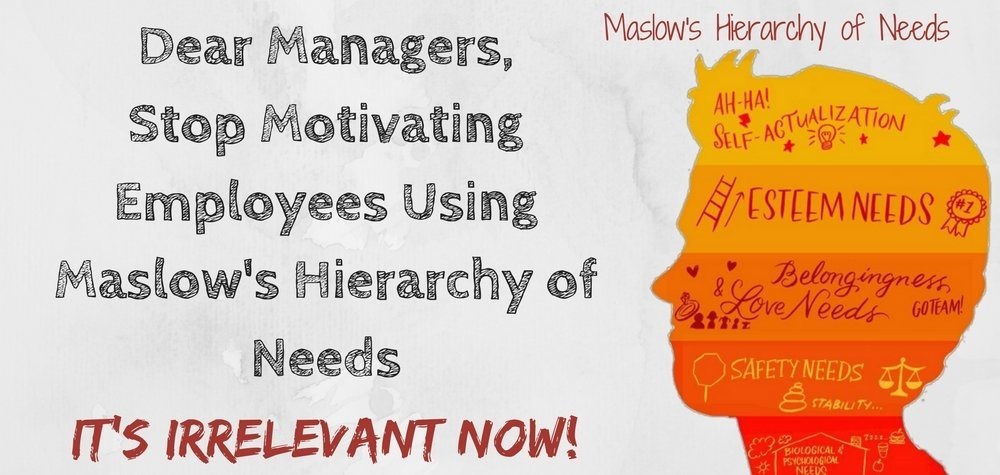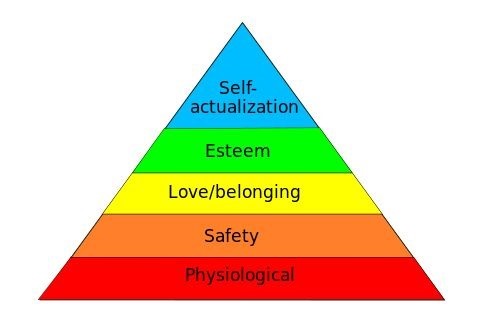Dear Managers, Stop Motivating Employees Using Maslow’s Hierarchy of Needs; It’s Irrelevant Now!

“Complete the report by end of the day, or else, you are out of the job”
I am sure employees must have heard this term a billion times, spoken by their immediate supervisor or manager. And when that employee becomes himself a manager, he uses the same for his team members, and the cycle continues.
Such crass form of motivation protocol stems from the Maslow’s Hierarchy of Needs, and this particular example is a clear cut case of hitting one of the layers within this pyramid: The need for a safe and secure job.
But, fortunately, things have changed. And now, this 64-year-old theory of motivation is irrelevant.
What Is Maslow’s Hierarchy of Needs?
In 1943, Abraham Maslow published his famous paper “A Theory of Human Motivation” in Psychological Review, wherein a particular theory caught the fancies of contemporary economists: “Maslow’s hierarchy of needs”.
Such was its influence that even today managers rely on it, deriving ‘tricks and tips’ to motivate employees. And often, the results are disastrous.
The Theory of Hierarchy of Needs has tried to decipher human needs and have categorised various needs based on their importance. As per the theory, the human mind is wired to satisfy the most pressing needs in the lower level, in order to attain to the other needs in the hierarchy.

The theory is often visualised in the form of a pyramid, wherein the psychological needs are placed in the bottom of the pyramid, which consists of the need for food, sleep, water etc. The need for safety is in the higher order, which consists of the safety of family, job and health. Often, managers target this particular need in order to ‘motivate’ the employee. As if ‘pressurizing’ the employee will yield ‘diamond’.
Need for love and belonging, need for self-esteem are higher up in the order, and self-actualization is at the top of the needs for a human being.
Why Is This Theory Irrelevant Today?
This theory was published in 1943, a time when jobs were scarce, and unless you were a capitalist, you were either a salaried employee or a farmer. Hence, the concept of money was the most powerful tool to inspire a person, and this same money formed the base of this theory.
However, now we are living in an age of the connected world, a knowledge-based economy wherein ideas are the currencies and money is just a by-product of this churn.
In this economy, when the very concept of jobs has changed, there is an abundance of opportunities and options, then the very fundamental of Maslow’s Hierarchy Needs principle falls flat.
Evidence To Support Why Maslow’s Theory Is Now Outdated
Harvard Business School professor Teresa Amabile and psychologist Steven Kramer asked thousands of employees to maintain a dairy, wherein they had to enter those instances when they felt elated or upset during their work.
Eventually, they analysed 12,000 diaries of employees, and surprisingly, the issue of money, security, safety or pressure was hardly mentioned in the entries done by employees. The factor which was highly quoted in the daily entries of employees was ‘small wins’.
The daily progress which the employees were making in their daily jobs mattered more to them, compared to how much money they were making.
Teresa and Steven called this as the ‘Power of Small Wins’, and this states that the employees are highly motivated when they feel that they are making a small yet consistent progress towards a meaningful purpose.
A similar study by psychologist Susan David (which was published in Harvard Business Review), she asked employees what motivated them in a job? And 96% of them did not mention money even once. As per the findings of the study, highly motivated employees “highlighted feeling autonomous and empowered, and a sense of belonging on their teams.”
This clearly proves that Maslow’s Hierarchy Needs principle is now outdated, and managers shouldn’t use this theory to motivate employees.
So, the question arises, how to motivate an employee without money? Yes, there are ways to motivate employees without using money as well, but this is just a start. As the connected, knowledge-based economy evolves, so will the protocols of motivation and the theories regarding them.
Do share your views on the outdated Maslow’s Hierarchy Of Needs by commenting right here!

A terrible article, if you are going to debunk Maslow you really need to put a lot more effort into it than this trash click-bait
You have completely contradicted yourself in this article. Like the previous poster, that opening statement is not a motivational statement.
You then go on to say that a survey found motivated employees “highlighted feeling autonomous and empowered, and a sense of belonging on their teams.” Belonging……hmmmm…….if only Maslow had thought to put that in his theory. Autonomy and empowerment……..surely if you are given those then it creates a feeling of esteem.
Small wins isn’t clearly defined but could easily indicate self actualisation.
You’re looking at the wrong end of the pyramid if you think security and safety are the motivators. They are described as the belly needs, the ones you have to have and you focus on those until you get them. People in a job tend to have have that sorted, there are some exceptions (the 4% who cited money perhaps?) and as a manager it’s worth keeping that in mind. Mainly, however, it’s the top three levels you should look to for how to motivate people and it’s just a guide, something to steer people in the right direction. At least if someone’s looking at this they’re considering what’s important to their people which is more than most managers do.
Oh, check your maths as well, it’s 74 years old.
“Complete the report by end of the day, or else, you are out of the job”
How the heck that is considered Motivation ?
That’s a fucking direct threat